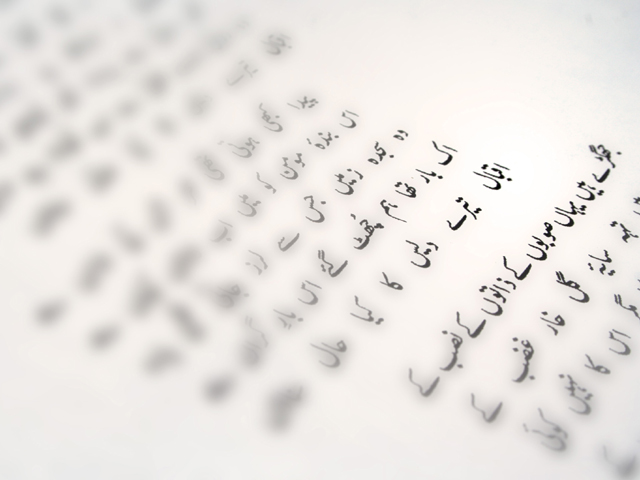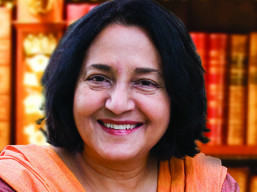
Some might regard Urdu as a language unique from Hindi, but, as implied by noted linguist and academic Tariq Rehman, those people have little ground to stand on.
Rehman was speaking about his new book “From Hindi to Urdu: A Social and Political History”, launched at the Islamabad Literature Festival.
Professor Rehman started off light, explaining that he wrote the book simply because “writing is my hobby”.
Moving on to the book, Rehman provided a short history of the development of Urdu and Hindi into separate languages from their common roots, adding that over 1 billion people speak Hindi or Urdu as a first or second language.
He then gave an anecdote from a meeting between former Soviet Premier Nikita Khrushchev, former Indian Prime Minister Lal Bahadur Shastri, and General Ayub Khan. Shastri and Khan were speaking without an interpreter.
Khrushchev asked both men what language they were speaking in. Shastri said Hindi, while Khan said Urdu. A baffled Khrushchev asked them how they understood each other, but received no reply.
While explaining that 1780 was the first time Urdu was called ‘Urdu’, moderator Harris Khalique, a noted poet in his own right, asked a question on how the language changed over time. Professor Rehman quoted a few verses from 14th century English poet Geoffrey Chaucer using the original old English to show how languages evolve.
He then used Sufi scripts from the 1300s which have quite a bit of ‘modern’ Urdu interspersed with Persian to illustrate Urdu’s evolution.
On the significance given to Urdu during the era of the British Raj, he said the rulers had made Urdu the language of the lower courts rather than Hindi, and explained that Urdu served as an identity marker because jobs were attached to it.
This led to the Hindi-speaking community developing pressure groups because Hindi-literate people felt alienated as they needed to learn Urdu for government jobs.
This led to a divide, which, when coupled with the loss of Muslim power in the centre, led to the ‘Islamisation’ of Urdu, and the ‘Sanskritisation’ of Hindi. Sanskrit and local dialect words were purged from Urdu, replaced by Persian and Arabic ones, Literary and cultural allusions moved to Islamic ones instead of those from local culture. Meanwhile references to Indian landscapes disappeared, replaced by Persian ones, while Indian romantic poetry, which focuses mostly on a man’s love of a woman, was replaced by Persian-style poetry, where a man loves a figure of indeterminate gender.
At the same time, there was also the enforcement of speaking Urdu with a Persian accent, possibly because after the loss of the empire — during which time it was the language of the elite — it was the only thing Muslims controlled.
Hindi adherents did the same, replacing common words with rarely-used Sanskrit terms. However, some influences from Hindi were not broken from, such as hard-ending sounds.
He said the language of Bollywood is actually closer to Urdu, illustrating that many directors keep munshis (clerks) or moulvis on set for Urdu dialogue pronunciation assistance.
Published in The Express Tribune, May 1st, 2013.
COMMENTS (4)
Comments are moderated and generally will be posted if they are on-topic and not abusive.
For more information, please see our Comments FAQ










































Hmmm urdu actually means camp in Persian. The Mughals developed this language in their military camps. Its widely practised in Hyderabad and some other parts like Lucknow today. Hopefully it will be the same case after several centuries. I feel more social intercourse should be encouraged between the 2 countries of the sub continent .
@gujranwala789: I live in a society in Mumbai which was given to Hindus and Sikhs who came from Sindh and Punjab in 47. They speak Sindhi and Punjabi but I have not come across a single one of them who does not know Hindi. We have very often people who come from Pakistan to visit people here, Hindus and Sikhs and they are fluent in Hindi. There are people here who came from Peshawar who are at ease with Hindi. Just like Dilip Kumar(yusuf khan) or PrithviRaj Kapoor was, both from Pesh. Sahir Ludhianvi and Shailender, 2 of our greatest Hindi lyricists were from Lahore and Pindi respectively. Bottomline is, if someone knows Urdu, he knows Hindi. That's how similar the spoken languages are. Another similarity is they are both umbrella languages. Used along with regional language. Just like Pak every state in India has its own language, but Hindi is a sort of overarching language. Vice versa for Urdu in Pak. Urdu as a language has borrowed heavily from Hindi. No surprises then that the largest Urdu speaking community in Pakistan is the so called Mohajir Qaum who came over from India and could use Hindi and Urdu interchangeably. Dont disagree with you bro, just speaking from a different perspective.
@Siddharth Pandey:
Pakistan never had "Hindi" in any part of the territory that is modern day pakistan before 1947. Even Urdu was also alien to these areas. Our cultural language was Persian and the dominant local languages included punjabi, sindhi, saraiki, pashto, balochi etc. in punjab, sindh, kpk and balochistan. It was only after 1849 when British occupied these areas and made "Urdu" the official language of education and government correspondence. So the educated people from these areas which form pakistan today were proficient in Urdu and that was also the reason why there was no big movement against urdu at 1947 when Quaid e azam declared it as national language of Pakistan. The reason is quite simple Urdu was already enjoying official status in the territory of pakistan, ironically thanks to British.
Good article and I'm sure it must be good book as well. Just one thing. Urdu as a language, it's newspapers, magazines and even Urdu TV channels are thriving in India. There is also a huge polpulation in North India that can speak Urdu but can't read or write it. A rather unique initiative has been started by some Urdu dailies to reach out to this readership. They have started printing Urdu dailies in the Persian and Devanagri script. The readership has exploded!! Unfortunately the same cannot be stated for Hindi in Pakistan which has been all but purged along with other things 'Hindustani' as Pakistan continues hurtling towards adopting a Persian and Arabic identity and shedding it's South Asian roots.